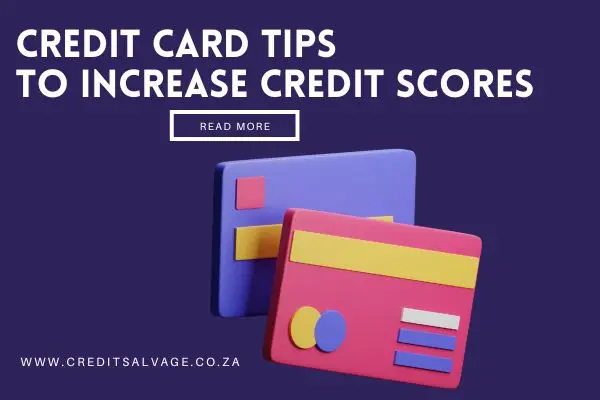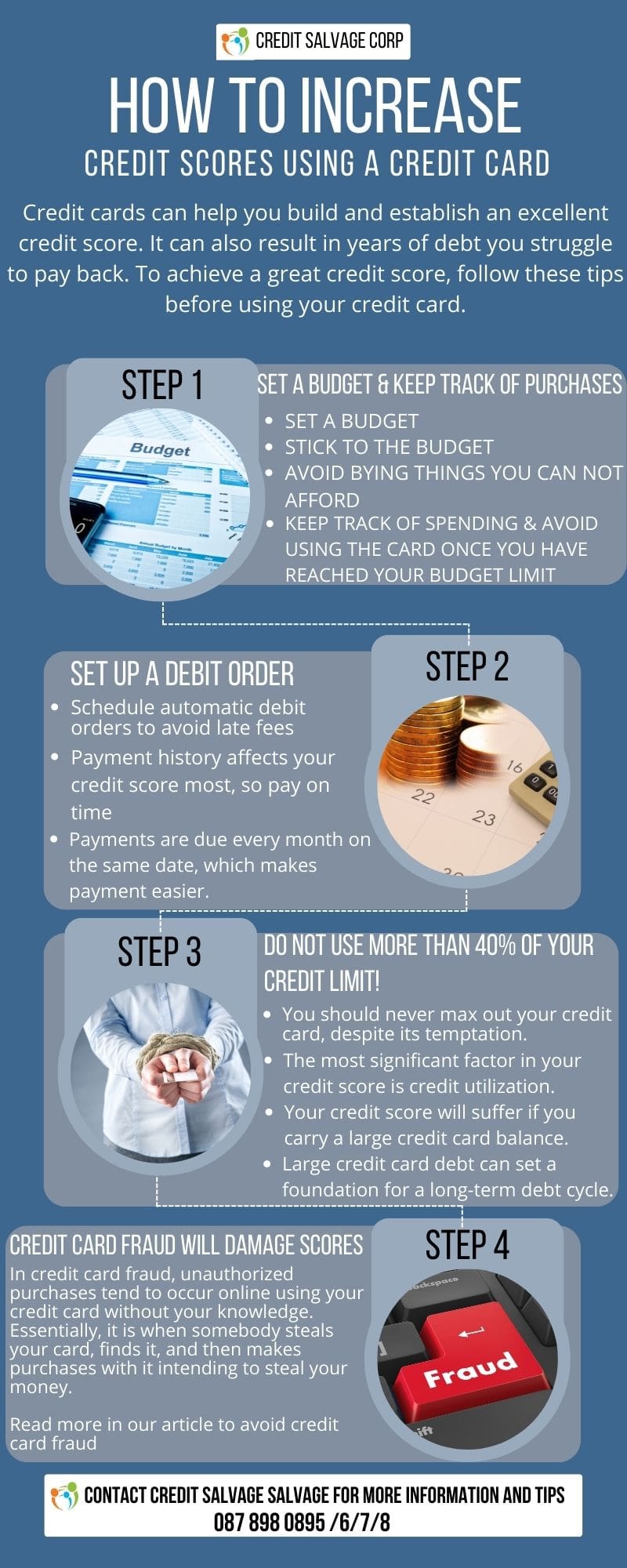Credit card and credit scores - Ways to Boost Credit Scores using a credit card
With the right credit card, you can make the most of your purchases and finance items effortlessly while enhancing your credit worthiness, credit report, and credit scores. In addition to boosting your credit score, this excellent product will also allow you to earn rewards at the same time. The responsible use of credit cards can be a valuable tool for financing the purchase of goods and services. However, if not used properly, there is also the possibility that it will have adverse effects on your finances as well as your credit scores.
You may initially see a drop in your credit score when you take out this facility. However, if you manage your Master or Visa card responsibly over time, you will be able to build a positive credit history over time.
If you make all your payments on time, complete them promptly, and stay within your credit limit, you will be able to appear to credit providers as someone who is financially responsible. The following weeks and months may result in an increase in your credit score, leading to a considerable increase in your card limit.
To get the most out of your credit cards and in our quest to answer your question - how can a credit card build my credit score? follow this article closely. As the title implies, this article aims to give you a comprehensive overview of how you can improve your credit scores with a more effective and responsible approach to these financial cards.
Credit Cards: How to use them wisely to improve credit bureau scores!
So, you have received your new facility and card with the aim to boost credit scores. The key is to use it strategically and not run out to the nearest store to finance expensive items knowing you won't have to pay for them immediately. One thing you should always consider when using this type of card is that you want the new facility to help you build your credit scores and develop a healthy financial profile rather than getting you into excessive debt. There are several ways to go about this, and here are a few of them:
Create a budget.
Credit cards and budgeting: Is it possible? As a rule of thumb, budgeting is all about making sure it does not become a habit for you to spend money you do not have. As a result of taking out a Master or Visa Card, you will inevitably spend money you do not have. Spending smarter with your Visa or master card can prevent you from getting trapped in a debt spiral you will find challenging to escape. A credit card's buy now, pay later structure can lead to you living beyond your means if you do not stick to a strict budget.
Your balance will quickly increase as you become increasingly free to spend the bank's money on whatever you want. Maintain a low balance, manage your payments, and keep your credit score high by not overspending your card. As a result, you will be able to afford your payments, and your card usage will be consistent. Follow the next Tips for an effective credit card budget.
Do not rely on your credit limit for your budget. Use your income figures to budget. Your budget begins with your monthly income and spending. It is important to remember that the money you see on your card under your credit limit is not yours and using this facility will incur interest charges. Tip#1: Never use your entire credit limit and make it a habit to use it as little as possible. Keeping your budget on track will automatically increase your credit score without you having to do anything extra and without even realizing it.
Essential tips: How to use your credit card wisely
- Plan and stick to a budget.
- It can be convenient to use these cards when making purchases without thinking about the consequences twice, but you should not use it to buy items you cannot afford. Keep yourself from getting in over your head by knowing how much you can spend and pay off each month. Make a budget and spend only 50% of your net pay on essentials and living expenses, 15% or less on items you don't need and 35% on debt repayment and savings. Keeping your spending in line with your income and other spending priorities will help you manage your debt. Eventually, you will see your credit score skyrocket without even realizing it if you manage your facility effectively.
- Paying accounts or settling debts with a credit card is never a clever idea.
- It is imperative for you to reassess your financial situation if you find yourself in a situation where you wish to make payments on your debts with your Visa or Master card. There is no doubt that interest rates on these cards are high, and the balances can quickly spiral out of control. Have a confidential discussion with one of our advisors and see how you can prevent yourself from falling into the debt trap.
- There should never be a situation where you miss a payment on your card.
- If you can only afford the minimum required payment, make sure you pay this account each month without fail! If you miss a payment, you will incur an overdue payment fee, penalty interest, collection charges, and, more importantly, it will damage your credit card and credit scores.
- Keep Track of Your Purchases and set up a debit order.
- The first step is determining how much you can afford to repay monthly on your new facility. Then, make sure this amount reflects in your budget. Track your monthly purchases carefully and make sure they are within your budget. As soon as you have reached your monthly spending cap, it is best to stay away from using the card until you have paid off all the outstanding debt on the card.
- You should leave your Master or Visa card at home, so you won't feel tempted to use it. It is a strict and challenging method of self-discipline, but once you become accustomed to it, you will find it more manageable.
- As of the end of the month, you will have to pay your newly added instalment every month, and it will take some time to get used to it. Schedule a debit order to prevent overdue payments on your Visa or master card account. If you want to pay more than the minimum payment, you should instruct the credit provider to load a debit order for more than that amount.
- The payment history on all credit agreements is one of the most significant factors in calculating a credit score. Keep your credit score climbing by paying all your accounts on time.
- Never use a credit card for impulsive purchases.
- Do not, under any circumstances, live on the available balance of your credit card. Paying off your outstanding balance at the end of each month will help you significantly increase your credit scores and debt to income ratios. Due to the higher instalments and high-interest rates, living off your available credit will damage your credit scores and increase your debt-to-income ratio. All banks offer a 54-day interest-free period on purchases made with these financial instruments. The interest-free period enables you to make purchases and pay off the balance in full without paying interest.
- Make the most of your credit card interest rate!
- As soon as possible, pay the balance of your outstanding balance in full each month so as not to pay interest on recent purchases. Making effective use of a Master or Visa Card without interest is easy if you resist the temptation to spend more than you can afford. If it is not possible to settle the balance within 54 days, paying the balance soon will be beneficial.
- As per the National Credit Act and the National Credit Regulations, a bank may charge a maximum interest rate of 20.5% on a Master or Visa card and a maximum interest rate of 27.5% on personal loans. On paper, the rates on credit cards are lower than the interest rates on offer on your typical personal loans. A credit scoring tactic that will prove to be an effective way to improve credit scores is to take advantage of this low-interest rate and pay off the balance in 54 to 80 days.
- Stay within your limit - ALWAYS!
- As tempting as it might be to max out your facility, it is crucial that you do not do this. The simplest way to increase or boost your credit score is to keep your credit utilization ratio below 40% whenever possible, regardless of your available credit.
- The credit utilization ratio represents how much of your total available credit you are utilizing at any given time. Utilization of credit plays a significant role in determining your credit score.
- To illustrate an example, if your credit limit is five thousand Rands, then it is recommended that you keep your balance under two thousand Rands. It is essential to keep in mind that this utilization ratio applies to all your outstanding credit agreements.
- For example, if one card is five thousand Rands with a two thousand Rands balance and another is two thousand Rands with a five hundred Rands balance, you are at roughly 36%. The calculation for the above example will be R2,500 out of an available R7,000, which is the level of credit utilization percentage you want to boost credit scores.
- Credit Card needs versus wants.
- Make sure you use your new facility only for emergencies and use it responsibly to improve your credit score, not to upgrade your lifestyle. It is prudent to use credit cards carefully as unmanaged frivolous purchases can lead to indebtedness. Using these cards can be convenient in times of need, such as when you owe money to a doctor or blood test account. Pay back your balance as soon as possible to avoid interest charges or to ensure you do not exceed your 40% utilization ratio.
- Use credit cards that offer rewards.
- Take advantage of credit cards that give you benefits and rewards. You can use these free rewards to reward yourself for being a responsible user. By using these cards effectively, you will boost your credit scores as well as earn some decent free rewards.
Credit Card Fraud will damage scores – Tips to use your card safely
In credit card fraud, unauthorized purchases tend to occur online using your facility without your knowledge. Essentially, it is when somebody steals your card, finds it, and then makes purchases with it intending to steal your money. There is also the possibility of your account information to be stolen as part of a data breach or if someone uses a skimming device to clone your card information to make in-store or online purchases. Master and Visa card fraud can impact your credit score if the fraudulent activity ends up in your credit reports. Here are some tips for keeping your Visa or Master card secure:
- Considering the importance of keeping passwords and s safe, we strongly recommend that it is kept confidential, and you do not write them down anywhere.
- Do not conduct your banking in public internet cafes or insecure terminals available in hotels and airports.
- It is imperative to avoid sending any electronic mail messages that contain your card number, expiration date, and CVV number. The information in your mail can be intercepted and used to make purchases without your knowledge.
- Review your account statement carefully each month and contact your bank immediately if you discover any unrecognized transactions.
- When shopping online, only place orders with your card with well-known companies offering secure websites. A protected website address should begin with the letters HTTPS rather than HTTP. S at the end of HTTP indicates that the website is safe, and the website is using an SSL. SSL stands for Secure Sockets Layer connection, which guarantees that all information entered the website will be encrypted before it gets sent to the server.
- Always keep your card in sight when it is time to use it and ensure that it returns to you after every purchase. It only takes a few minutes to clone a card.
- Report the loss or theft of a card immediately with the bank that issued the card.
- Do not use your card to withdraw money from an ATM as it will cripple your creditworthiness with the bank, but if you do and your card gets swallowed, contact your bank immediately and cancel it before you leave that ATM.
- Do not choose the same PIN for all your cards.
- Do not reveal your passwords or PINs to anyone over the phone, fax, or email if they ask for it. Please note that bank employees will never ask you for your pin. In such a case, report the staff member immediately to the bank's complaints department.
- Inspect the ATM slot and see if it looks natural. If it does not look right, do not insert your card.
- Enable SMS notifications on your card to be notified of transactions.
Conclusion
Having discussed credit cards and credit scores in detail, we have now concluded. As a result, if these cards are handled responsibly, they can be a valuable financial tool under the right circumstances. Your credit score will increase if you make regular, on-time payments on your credit cards, and some cards may even offer rewards for purchases along with 0% interest on outstanding balances if you pay it off within 54 days.
There is no doubt that if you get out of control with your credit spending, you may find that monthly payments and accumulated interest can become a problem for many years afterward.
Finally, you should take the steps mentioned above to protect yourself against ever-present fraud.
Credit card and credit scores Frequently Asked Questions (FAQs).
If I am late with my payment, what will happen?
When you are even one day late, you run the risk of having to pay a late fee. Irrespective of whether you missed a payment accidentally or intentionally, you will end up damaging your credit report and lowering your credit score because of this oversight.
My card has been used fraudulently. What should I do?
You should immediately contact the bank that issued your card if you believe any transactions posted to your account are fraudulent. Your card may have a customer service number on the back. If you do not find it on your card, you may find it on your statement.
Is it better to use my credit card for all my expenses to earn more points on a rewards program?
Many people indeed use their Visa or Master cards for most of their monthly expenses and entertainment needs to earn the most points possible, but this can only work if you pay off your outstanding account balance in full each month. In the event that you do not settle the entire balance by the due date, then any rewards you have earned will be offset by the interest on the outstanding balance.
Do too many credit cards affect my credit score?
When you have too many facilities of this type with high outstanding balances and large monthly repayment instalments, you are likely to have a negative impact on your bureau score. It all depends on your overall credit history and utilization ratio. The most important thing to remember is to keep your credit utilization ratio below 40% whenever possible.
How do you keep your utilization rate low?
You should not max out your Visa or Master Card, and you should ensure that there are no large balances on these types of cards. Your utilization rate can be decreased to between 30 and 40% by paying more towards your balance every month and settling your facility from month to month.
What are the effects of closing a credit card on your bureau report and score?
There is a possibility that closing the card will affect your credit score if it changes your overall credit utilization ratio. As mentioned above, your credit utilization ratio is a measurement of how much of your total available credit you are using, based on the information on your bureau reports. It is essential to remember that the more available credit you use, the worse the impact. As a rule of thumb, a 30-40 per cent ratio tends to be the ideal level.
Whenever you need us, and you have a question about clearing your credit bureau report, or if you need debt assistance, we are here for you.
Feel free to contact us via any of the following methods
Online chat:
Located at the bottom right corner of our website
(you'll be chatting with one of our proficient client care managers) A director will also join the conversation in cases of complex situations.
Contact: 087 898 0895/6/7/8
E-mail:
You can apply for our services online here:


